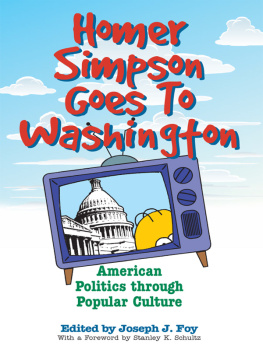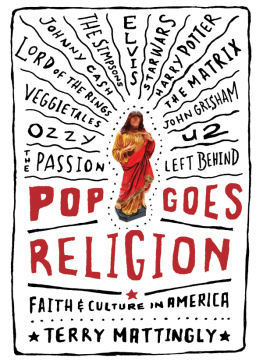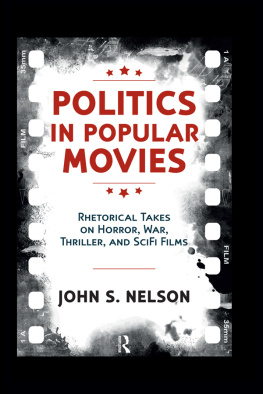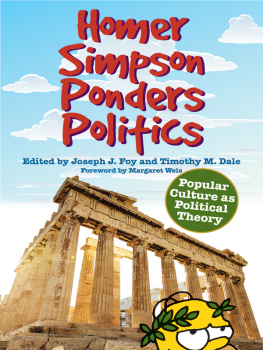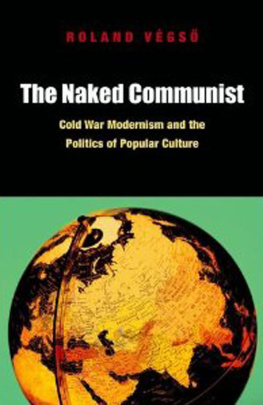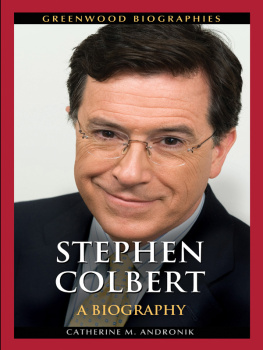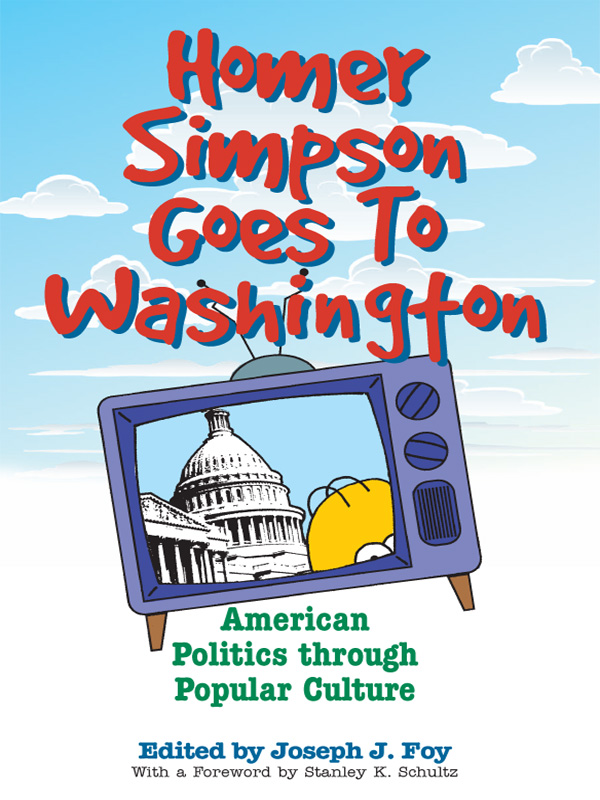All rights reserved.
Homer Simpson goes to Washington : American politics through popular culture / edited by Joseph J. Foy ; with a foreword by Stanley K. Schultz.
p. cm.
Includes bibliographical references and index.
ISBN 978-0-8131-2512-1 (hardcover : alk. paper)
1.United StatesPolitics and governmentMiscellanea. I. Foy, Joseph J.
Manufactured in the United States of America.
FOREWORD
Let's not begin by debating the relevance of various popular culture materials to our understanding of theory and practices in the supposedly democratic arena of American politics. Let's also refuse to dicker over the merits of high culture (enduring classics in art, architecture, literature, poetry, and music in both Western and non-Western traditions) versus low culture (the entertainment mediums of the masses, both past and present). Let's not become proverbial dogs chasing our own tails with logic such as: Shakespeare and opera were entertainment vehicles for the common folks until they became, in more modern times, the cultural preserves of elitist snobs. We need not follow these pathways. The authors of this book's essays present thorough disquisitions about the seemingly endless debates, dickering, and tail chasings among academics and other self-proclaimed cultural gurus over such issues.
Instead, let's agree, as an even cursory review of the nation's past reveals, that in the American experience at least, political practices, institution building, and reform campaigns have stood at the core of, have been shaped by, and in turn have reshaped our popular cultural expressions. Let's concur that, more often than not, the mediums of popular culture at given moments in the past have both reflected current political practices and redirected those practices for present and following generations.
No less an intellectual gadfly than Ralph Waldo Emerson once landed on the assertion that the education of the general mind never stops. What the tender poetic youth dreams, and prays, and paints today shall presently be the resolutions of public bodies; then shall be carried as grievance and bill of rights through conflict and war, and then shall be triumphant law and establishment for a hundred years, until it gives place in turn to new prayers and pictures. Emerson concluded that the history of the State sketches in coarse outline the progress of thought, and follows at a distance the delicacy of culture and of aspiration. Although Emerson always was ready to pontificate on any subject and therefore uttered more than his rightful share of nonsense, this observation strikes me as a particularly apt analysis of the inevitable interplay between popular culture and politics in America. Americans are a people who, from their national birth pangs onward, have told themselves as well as the rest of the world that they have built a classless society based on human equality, freedom of boundless opportunity, and reward for individual initiative. How could such a people's politics and political institutions ever stand separate from their everyday cultural activities and aspirations?
Emerson hardly occupied a solitary position in showing the interplay of politics and popular culture in the American past. In colonial New England towns, for example, where citizens lacked other forms of public engagement and entertainment, church sermons served as the social glue that held communities together. They functioned as instruction, edification, and drama and were nearly the sole form of public cultural discourse. Law required everyone's attendance at the two sermons on the Sabbath, at the customary Thursday lecture-sermon, and at the many days appointed for fasting and thanksgiving throughout the year, while the election-day sermon was the vehicle that drove political events and public participation in politics prior to the American Revolution. What happened in religion happened elsewhere in society. If we gather together the usual crop of historical personages (usual to American historians, at least) and review their observations, we find that Emerson was in the mainstream.
In his classic (always quoted by historians of the American colonies) Letters from an American Farmer (1782), French migr J. Hector St. John Crvecoeur answered his own question of What is an American? by emphasizing the fluid intermingling of cultural practices and attitudes with political activity:
As citizens it is easy to imagine, that they will carefully read the newspapers, enter into every political disquisition, freely blame or censure governors and others. As farmers they will be careful and anxious to get as much as they can, because what they get is their own. As northern men they will love the cheerful cup. As Christians, religion curbs them not in their opinions; the general indulgence leaves every one to think for themselves in spiritual matters; the laws inspect our actions, our thoughts are left to God. Industry, good living, selfishness, litigiousness, country politics, the pride of freemen, religious indifference, are their characteristics.
Another Frenchman, Alexis de Tocqueville, published in 1835 the comprehensive study Democracy in America. For most historians, the work remains one of the two definitive explications of the American social order by an outside observer. For Tocqueville, whatever Europeans meant by culture was, in the United States, by definition a commonly shared set of attitudes, beliefs, and practices, in short, a popular culture: A middling standard has been established in America for all human knowledge. As a result one finds a vast multitude of people with roughly the same ideas about religion, history, science, political economy, legislation, and government. These social commonalities underlay Americans faith in the sovereignty of the people and inevitably shaped the nation's politics. It is easy, Tocqueville affirmed, to deduce the political consequences of such a social state. By no possibility could equality ultimately fail to penetrate into the sphere of politics as everywhere else.
The other literary crutch on which many historians lean to explain the so-called American national character is a tome by English historian Lord James Bryce, The American Commonwealth

